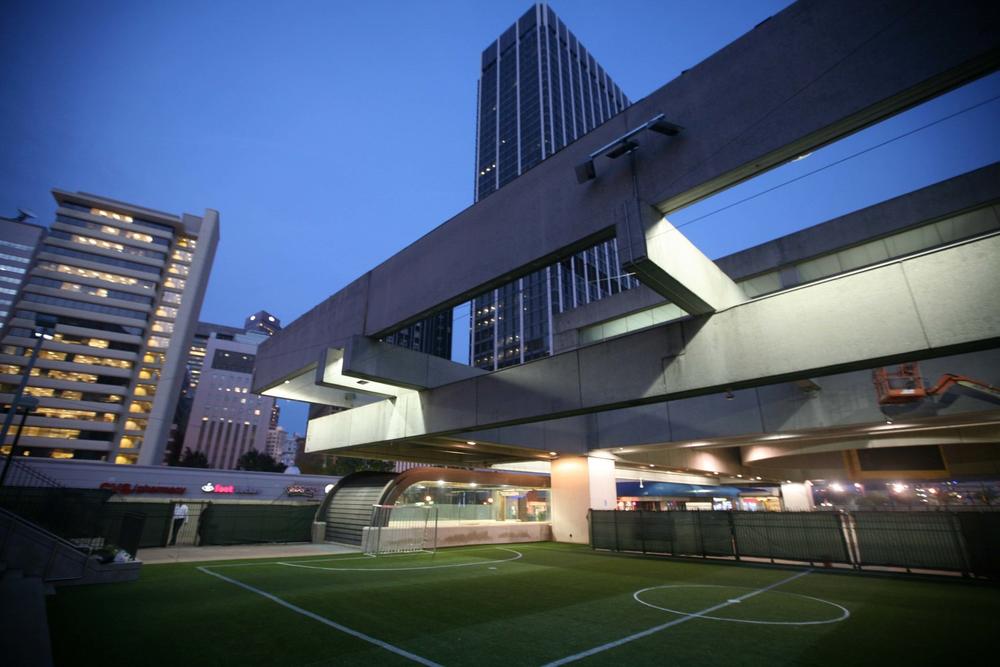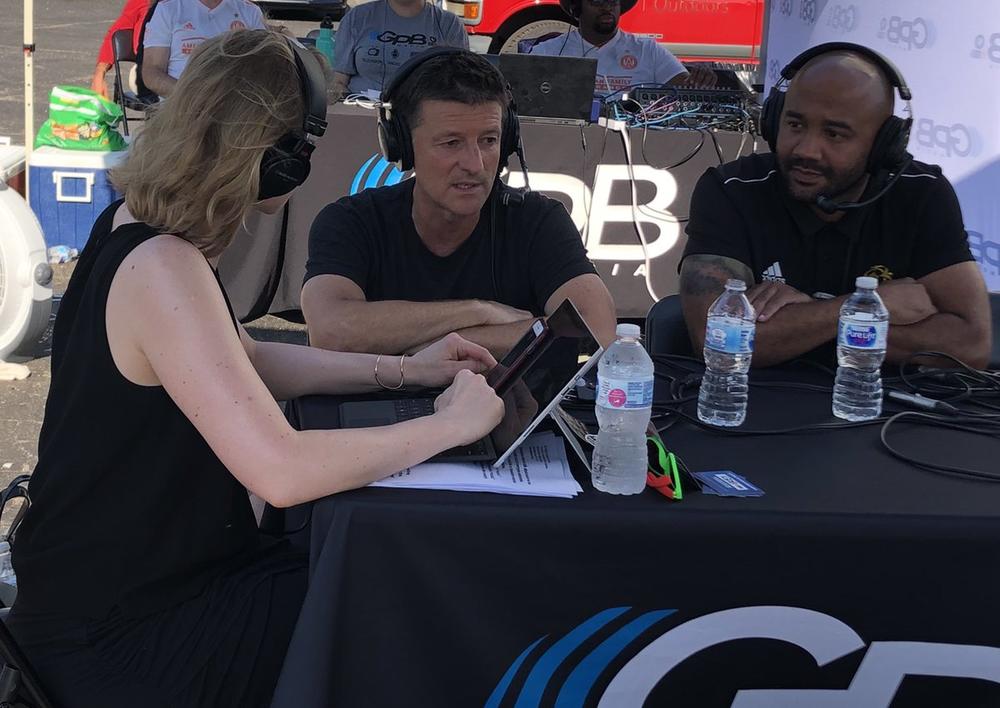Section Branding
Header Content
Soccer In The Streets Celebrates 30 Years Of Youth Development In Atlanta
Primary Content
If you ask adults why they played sports as a kid, they might say because it was fun.
If you ask adults what skills they learned from sports, they might say teamwork, discipline and leadership.
Teaching young people those life skills is the mission of Atlanta-based non-profit Soccer in the Streets, which is marking three decades working in communities like Clarkston, Vine City and Jonesboro. GPB's Rickey Bevington sits down with Phil Hill and Tony Carter with Soccer in the Streets during a live show about Georgia soccer culture at an Atlanta United tailgate in downtown Atlanta.
Founded in 1989, the organization brings quality soccer programs to metro Atlanta kids as a tool to teach them leadership development, discipline and job skills.
Three years ago, Soccer in the Streets launched StationSoccer with a soccer field at the Five Points MARTA station in downtown Atlanta. Since then, the program has expanded to another field at the West End station, with plans to create the world's first transit league of 10 stations.
GPB's All Things Considered host Rickey Bevington explored Georgia soccer culture in a show broadcast live from an Atlanta United tailgate in the Gulch in downtown Atlanta on May 29.
She talked to Atlanta United superfans, youth players with the Atlanta United Academy and the founders of a new professional soccer team in Statesboro, Ga.
She also sat down with Soccer in the Streets Executive Director Phil Hill and Director of Programs Tony Carter.
Rickey Bevington: Why don't we start with an overview of what the organization is?
Phil Hill: Soccer in the Streets is not really about soccer per se. Our goal is to provide youth who live in communities that lack resources with a better pathway to better opportunities in life. We believe that they can build powerful, vibrant communities for themselves and for others.
Bevington: How did the organization get started 30 years ago?
Hill: Thirty years ago, a lady in Jonesboro, just south of Atlanta, called Carolyn McKenzie was watching a group of kids, Latino kids, who weren't doing what they should have been doing. She saw them playing soccer, and she was like, "Well maybe if I could use soccer to give them a more positive outlook on life, I could help put them on a better path."
It all started from there, and it popped into the 1994 World Cup and took off.
Bevington: Tony, as director of programs, you see what that looks like day to day on the ground. What are all the programs that Soccer in the Streets has grown into in 30 years?
Tony Carter: Well, it's crazy how much it has grown within the last couple of years, especially with StationSoccer, which we started in 2016. At first, [we] started over at Five Points at the MARTA station there, and then we opened our second location at the West End station.
StationSoccer definitely has been a vibrant thing that's gotten us a lot of publicity and attention. So those communities around there have gotten a lot of participation from the kids. We also have seen some great participation with our community programs that aren't located by the stations.
So, by the city [Atlanta] and Clarkson, those programs have been quite vibrant for us and the kids. What I love to see is that, of course you are learning to love the game and are learning the ABCs of the game as well, but also, the ABCs of life off the field. That's the thing that I love seeing on the ground with Soccer in the Streets.
Bevington: Phil, I'll have you clarify what StationSoccer is.
Hill: Yes. StationSoccer is an initiative that was founded in Atlanta as the world's first. So, bravo to Atlanta. It was founded as a partnership between Soccer in the Streets, the Atlanta United Foundation, the city of Atlanta and, of course, MARTA. The whole premise behind it is to give access to our kids in 10 locations around the city and provide them a way to travel between these locations using the transit system. Lack of mobility is the single biggest issue for creating participation in programs such as ours.
Bevington: So, you bring soccer to them?
Hill: We bring soccer to them. We're building two mini-fields at each MARTA station. We're even looking at bringing classrooms and learning centers to these locations as well where we can deliver our leadership programs around financial literacy and teach them to run businesses and volunteer programs.
Bevington: Tony, what does a project look like on a day-to-day basis in a community like Vine City?
Carter: So, we obviously do the soccer component, where kids will have a training session and go through a typical practice that you would do at any soccer club or team.
Also, what we do is we have our youth councils, our youth leadership programs, and the thing that's been exciting to witness is that these kids have come up with these ideas that they want to implement.
One of the motivating factors was that they wanted to make money. How that came to be is helping them figure out this entrepreneurial leg for them. One way that's being worked out is that they're starting to develop their own logo, their own crest for their team, which is now starting to become merchandising and making T-shirts and scarves that they're looking to sell within the community and hopefully worldwide one day.
Bevington: That's amazing. Phil, you had mentioned financial literacy. Soccer in the Streets is so much more than just soccer, and it must be such a joy for you both to do this professionally.
Why have you made the decision to devote your careers to bringing soccer to young people?
Hill: I truly believe in building places where we live, and where we want to live and they should thrive. I also truly believe that everyone should be given an equal opportunity to access that as well. Soccer, for me growing up, started when I was 4 as soon as I could walk, and it became a vehicle for me.
I've traveled the world backpacking, and I took a ball with me. I've played in the desert in Egypt. I've played in Turkey, and every location I went to, all it was was a case of putting the ball down and playing the sport. That's all the language you needed.
We have a very strong program in Clarkson that's got a big refugee population. I was just talking to a kid who arrived there a couple of weeks ago from Rwanda, and his language is soccer. I mean it allowed him to assimilate into a very strange country with a lot of new faces. I don't know his background, but it's pretty probable he comes from a very difficult background. I just think a sport like soccer creates that bridge.
Carter: I have to say for myself there are some similarities. I love the universal language that soccer is. For myself, being born and raised here in Atlanta, I came from a middle-class background. Money was never really an issue for me growing up, and to have a life where soccer provided me some opportunities, [I] played in college and met some amazing people and had some great travel experiences.
Soccer joins people, and there's a reason why the World Cup is a worldwide event where everybody is watching. It's because the fact that you have so many people from various walks of life coming in to watch a ball being kicked around. I mean, there's something amazing about that.
The fact that I've had all these opportunities from this little game that shouldn't cost anything to play, I feel like it is part of my duty to help spread that within the city of Atlanta. I love this city. I love the game, so why not spread it?
This conversation has been edited for content and clarity.




